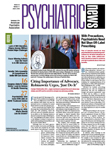More than 120 leading experts in psychiatry, neuroscience, genetics, epidemiology, pediatrics, statistics, nursing, and social work will collaborate to draft the next edition of the most important manual in psychiatry, DSM-V, within the next four years.
At a news conference on May 1, APA released a list of more than 120 world-renowned clinicians and scientists who will undertake the massive effort of revising DSM. Every work group member's name, affiliation, biographic information, and potential conflicts of interest are disclosed in detail at<www.dsm5.org>.
In the next four years, these contributors, divided into 13 work groups, will review a sea of research evidence, revise current diagnostic criteria for field tests, and, based on feedback from the field tests, make changes as required. A final draft of the groups' findings will be submitted to the APA Council on Research, the Assembly, and the Board of Trustees for review. DSM-V is anticipated to be released in May 2012.
Work group members will meet regularly in person and by conference calls. Their first priority will be “to see how much the accumulated research evidence over the past 15 to 20 years is applicable to improving the diagnostic process in clinical practice,” said David Kufper, M.D., chair of the DSM-V Task Force. In addition, the work groups will determine whether current diagnostic criteria need to be modified, whether new disorders should be added, or whether there is sufficient evidence to delete any current diagnoses.
Darrel Regier, M.D., M.P.H., vice chair of the task force, indicated at the press conference that the work groups will pay particular attention to cross-cutting issues in mental disorders over a person's lifespan, including how early neurological development may influence various mental disorders.
“We will discuss possible changes in the criteria as one moves from childhood...to late life.” He said the impact of gender and culture on different expressions of mental disorders will also be addressed in this revision.
“We are rethinking the fundamental structure of DSM, which would be a first since 1980, when DSM-III was produced,” said Regier. He referred to a new approach of looking at each spectrum of multiple mental disorders that are currently separate but may be biologically or symptomatically linked. Such a revised diagnostic structure will help clinicians better understand the relationship between disorders and treatment implications.
The DSM-V Task Force members who will lead the effort in each work group were announced in 2007. Work group members were nominated by the task force chair, vice-chair, and work group chairs based on their international expertise in specific fields. All work group members were reviewed for potential conflicts of interest and approved by the APA Board.
Like the task force members, all work group members are required by APA to disclose significant relationships since 2005 with entities that have an interest in psychiatric diagnoses and treatments, including pharmaceutical companies and nonprofit or advocacy organizations. All work group and task force members have agreed to abide by rules intended to prevent conflict of interest or bias. For example, each work group member's annual income derived from industry sources (excluding unrestricted research grants) cannot exceed $10,000 in a calendar year throughout the time of their involvement with DSM-V.
“We are fortunate to have such a high caliber of researchers in this undertaking,” Carolyn Robinowitz, M.D., then-APA president, said at the news conference. She noted that the work group members will not receive monetary compensation for this work. “The goal of the APA Board of Trustees is to ensure that each contributor to DSM-V represents the best [expertise] in his or her field and that the process is open, transparent, and free of bias.”
“DSM is the foundation for psychiatric diagnosis in much of the world,” incoming APA President Nada Stotland, M.D., M.P.H., told Psychiatric News. “The signs and symptoms of psychiatric disorders are affected by culture, gender, race, age, sexual orientation—by complex interactions between nature, nurture, and current circumstances. APA accepts the responsibility for crafting this enormously important document and depends upon the expertise of researchers and clinicians from all the branches of our field, and we welcome the comments and suggestions of not only our members, but anyone with an interest and an idea.”
In addition to the names of the DSM-V Task Force and work group members, other related information is posted at<www.dsm5.org>.▪
